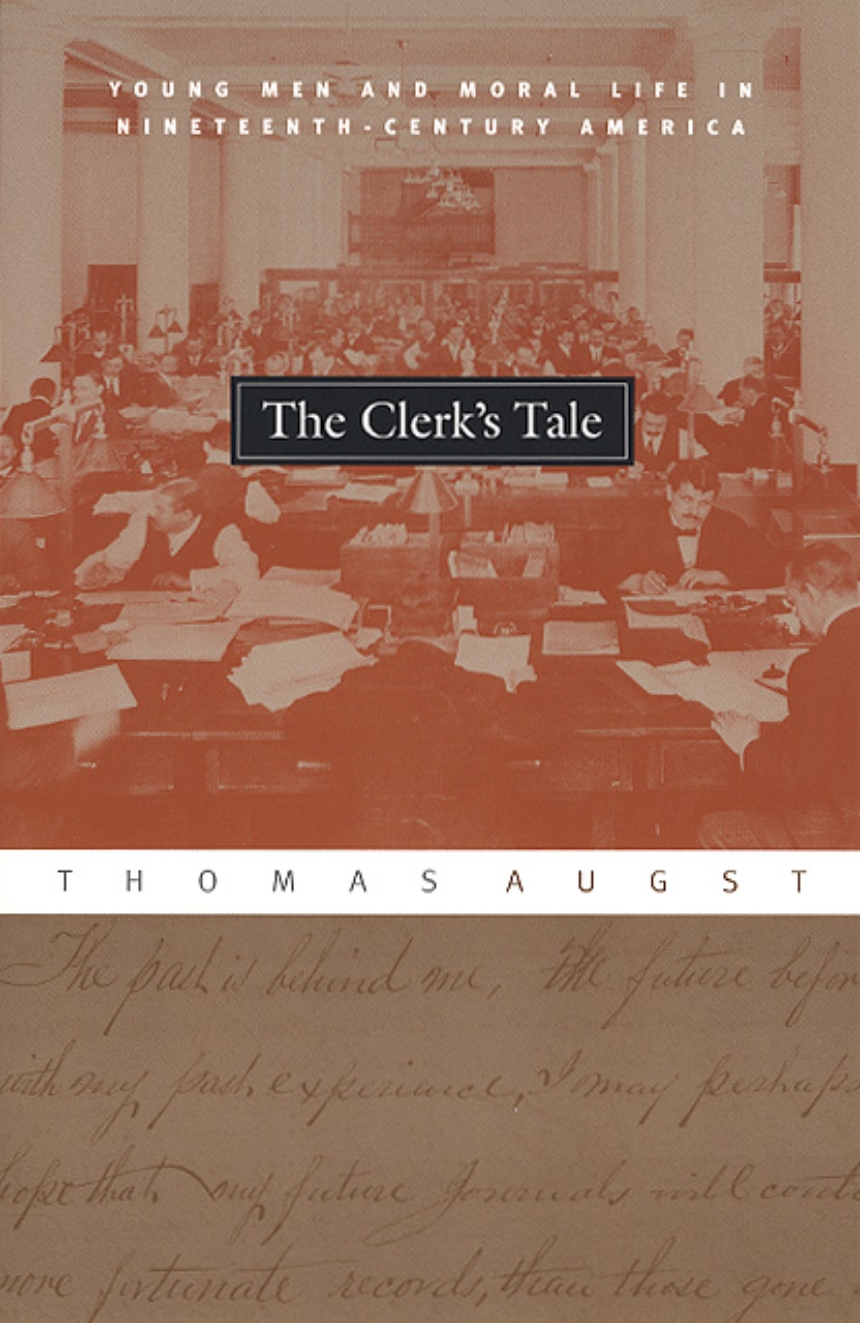The Clerk’s Tale
Young Men and Moral Life in Nineteenth-Century America
9780226032207
9780226032191
9780226795737
The Clerk’s Tale
Young Men and Moral Life in Nineteenth-Century America
Thousands of men left their families for the bustling cities of nineteenth-century America, where many of them found work as clerks. The Clerk’s Tale recounts their remarkable story, describing the struggle of aspiring businessmen to come of age at the dawn of the modern era. How did these young men understand the volatile world of American capitalism and make sense of their place within it?
Thomas Augst follows clerks as they made their way through the boarding houses, parlors, and offices of the big city. Tracing the course of their everyday lives, Augst shows how these young men used acts of reading and writing to navigate the anonymous world of market culture and claim identities for themselves within it. Clerks, he reveals, calculated their prospects in diaries, composed detailed letters to friends and family, attended lectures by key thinkers of the day, joined libraries where they consumed fiction, all while wrestling with the boredom of their work. What results, then, is a poignant look at the literary practices of ordinary people and an affecting meditation on the moral lives of men in antebellum America.
Thomas Augst follows clerks as they made their way through the boarding houses, parlors, and offices of the big city. Tracing the course of their everyday lives, Augst shows how these young men used acts of reading and writing to navigate the anonymous world of market culture and claim identities for themselves within it. Clerks, he reveals, calculated their prospects in diaries, composed detailed letters to friends and family, attended lectures by key thinkers of the day, joined libraries where they consumed fiction, all while wrestling with the boredom of their work. What results, then, is a poignant look at the literary practices of ordinary people and an affecting meditation on the moral lives of men in antebellum America.
328 pages | 25 halftones | 6 x 9 | © 2003
Culture Studies:
History: American History
Literature and Literary Criticism: American and Canadian Literature
Philosophy: Ethics
Sociology: Sociology--Marriage and Family
Table of Contents
List of Illustrations
Acknowledgments
Introduction: The Moral Economy of Literacy
Chapter One
Accounting for Character: Diaries and the Moral Practice of Everyday Life
The Coin of Character
Memory and the Commonplace Tradition
Self-Examination and the Devotions of Literacy
Time Is Money: The Value of the Future
Equality of Aspiration
Chapter Two
Forms of Feeling: Habit, Sociability, and the Domestication of Literary Taste
The Drill of Nature: Habits of Writing across Time
Letters and the Debts of Family
The Profit of Pleasure
The Art of Conversation
Sentimental Pathos and the Conventions of Intimacy
Chapter Three
Popular Philosophy and Democratic Voice: Emerson in the Lecture Hall
Becoming Whole: The Struggle for Composure
Modes of Civic Education: The Public Lecture
The Eloquence of Moral Life
Chapter Four
Making Society out of Books: The New York Mercantile Library and the Enterprise of Reading
Circulating Libraries and the Business of Books
Reading and Breeding for the Profession
The Liberty of Intellect and the Taste for Fiction
Chapter Five
The Melancholy of White-Collar Work: Professional Ethos and the Modern Literary Sphere
The Blank Page and the Place of Writing
The Credit of Character, in Parts and Whole
Professional Authorship and the Literary Sphere
Epilogue: Debris from the Business of Living
Notes
Selected Bibliography
Index
Acknowledgments
Introduction: The Moral Economy of Literacy
Chapter One
Accounting for Character: Diaries and the Moral Practice of Everyday Life
The Coin of Character
Memory and the Commonplace Tradition
Self-Examination and the Devotions of Literacy
Time Is Money: The Value of the Future
Equality of Aspiration
Chapter Two
Forms of Feeling: Habit, Sociability, and the Domestication of Literary Taste
The Drill of Nature: Habits of Writing across Time
Letters and the Debts of Family
The Profit of Pleasure
The Art of Conversation
Sentimental Pathos and the Conventions of Intimacy
Chapter Three
Popular Philosophy and Democratic Voice: Emerson in the Lecture Hall
Becoming Whole: The Struggle for Composure
Modes of Civic Education: The Public Lecture
The Eloquence of Moral Life
Chapter Four
Making Society out of Books: The New York Mercantile Library and the Enterprise of Reading
Circulating Libraries and the Business of Books
Reading and Breeding for the Profession
The Liberty of Intellect and the Taste for Fiction
Chapter Five
The Melancholy of White-Collar Work: Professional Ethos and the Modern Literary Sphere
The Blank Page and the Place of Writing
The Credit of Character, in Parts and Whole
Professional Authorship and the Literary Sphere
Epilogue: Debris from the Business of Living
Notes
Selected Bibliography
Index
